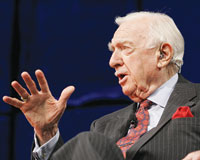NCAA News Archive - 2006
« back to 2006 | Back to NCAA News Archive Index
Cronkite conversation covers journalist’s views on college sports, education, history
|
Special to The NCAA News
Consider that Walter Cronkite has worked in journalism longer than either Joe Paterno or Bobby Bowden has coached.
It’s therefore fitting that the two college football memories he mentioned during his “Intimate Conversation” with NCAA Convention attendees covered a time-span longer than many of them have been alive.
One happened four days before the January 8 session, when the speaker’s beloved Texas Longhorns took the Bowl Championship Series title game. Cronkite made clear his passion for the school he left before graduation, but for which he still bears an alumnus’ love.
“They won a pretty good football game the other day,” the legendary newsman understated.
The other reference traced back to when sporting events were just starting to receive “live” radio coverage, which Cronkite provided. The 89-year-old risked the title he once had as “The Most Trusted Man in Television News,” by admitting to the 854 attendees that the label didn’t necessarily apply to radio.
Prompted by the audience about his brief time as a sports broadcaster, Cronkite reminisced about a Notre Dame-Southern California battle, a big game even then. As was the custom in those days, Cronkite covered the game from the
“(
During that game, the feed went comatose. Cronkite had to fess up or fill the space with pure imagination. Expecting a short delay, he ventured down the latter path.
“I was ad-libbing, saying ‘there’s no gain on it,’ ” he said. “Then it still wasn’t back, so I called a timeout. It was down for 45 minutes. I had the longest quarter ever played in college football.
“When it came back,
He almost missed his Longhorns’ recent glory too, he said. His team had fallen behind. He couldn’t follow the full-field views on the screen. It was late.
“I almost turned it off. I don’t know what I would have done if I’d missed (that ending),” he said of
This from a man who personally covered World War II, Vietnam, President Kennedy’s assassination, Watergate and seemingly everything else of import that happened in the 20th century’s electronic age. Deep down, he was a fan worried about missing his team’s biggest game.
Despite this allegiance to college athletics, Cronkite spoke bluntly — and mostly inaccurately — when answering a question from on-stage interviewer NCAA President Myles Brand. The query was about the speaker’s thoughts on the
“I think it’s a very good thing, as long as we quit doing what we’re doing, which is buying them,” he said, speaking of the exceptions rather than the norm. “We’re paying them. I know you are working very hard to straighten it out, Myles.”
A surprised Brand nodded, and assured that yes, he and the NCAA were indeed working on such issues.
Other than the welcoming standing ovation, the biggest applause followed Cronkite’s scathing critique of the current status of the country’s educational system, primarily at the scholastic level.
“Education is essential to democracy and we’re not doing the job,” said Cronkite, who has covered news for 65 years.
“It’s a disaster. We are not paying the attention to education we need to pay if we want democracy to succeed. As Thomas Jefferson said, the nation that expects to be ignorant and free expects what can never be.”
Aside from those observances, the majority of the chat had little to do with NCAA matters directly ... or did it? After all, the Association’s promotional TV spots remind viewers that most student-athletes end up in careers other than sports.
The bulk of the program covered “merely” the events that shaped the lives of those who lived the 20th century, delivered in the 21st by the man who first reported them to many in the audience.
Despite the breadth of his career’s assignments, Cronkite responded definitively when asked which was most important. But he readily admitted that he didn’t handle that one very well professionally, despite once being called “Old Iron Pants” for his unflappability under pressure.
“When we landed on the moon, that was and is the greatest story of our time. People will be talking about that date 500 years from now, when they are living there, just as schoolchildren today talk about
Brand offered that the event was so important that “it might even leave one speechless.”
“I’m sorry you mentioned that,” the venerable journalist said graciously.
“I had as much time as NASA did to prepare for that and all I could come up with when they landed was ‘boy oh boy, wow.’ ”
As Brand helped Cronkite exit the stage at the close of the program, the avid sailor made sure to tie in athletics one last time. He told the audience that his immobility wasn’t from rheumatism but from a pulled Achilles tendon he suffered playing tennis. But that wasn’t enough.
“It was a singles game and I won it,” he said.
So, with an edit for proper tense, that’s the way it was,
© 2010 The National Collegiate Athletic Association
Terms and Conditions | Privacy Policy

